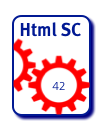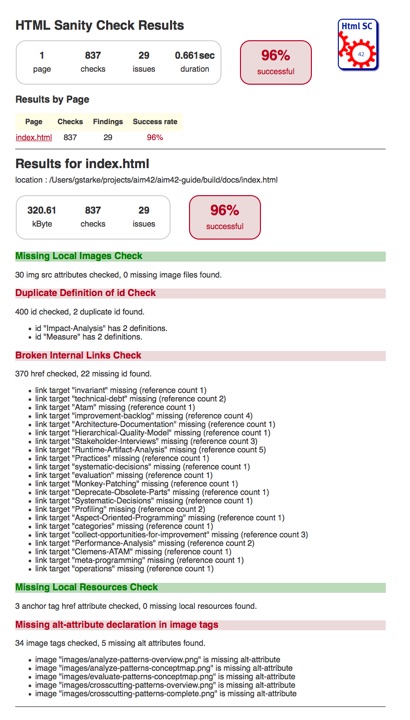plugins {
id 'org.aim42.htmlSanityCheck' version 'v2.6.7'
}
 Html Sanity Check
Html Sanity Check
This project provides some basic sanity checking on html files.
It can be helpful in case of html generated from e.g. Asciidoctor, Markdown or other formats - as converters usually don’t check for missing images or broken links.
It can be used as Gradle plugin. Standalone Java and graphical UI are planned for future releases.
Installation
Use the following snippet inside a Gradle build file:
OR
buildscript {
repositories {
maven {
url "https://plugins.gradle.org/m2/"
}
}
dependencies {
classpath ('gradle.plugin.org.aim42:htmlSanityCheck:v2.6.7')
}
}
apply plugin: 'org.aim42.htmlSanityCheck'Usage
The plugin adds a new task named htmlSanityCheck.
This task exposes a few properties as part of its configuration:
| sourceDir |
(mandatory) directory where the html files are located. Type: File. Default: |
| sourceDocuments |
(optional) an override to process several source files, which may be a subset of all
files available in |
| checkingResultsDir |
(optional) directory where the checking results written to.
Defaults to |
| junitResultsDir |
(optional) directory where the results written to in JUnit XML format. JUnit XML can be
read by many tools including CI environments.
Defaults to |
| failOnErrors |
(optional) if set to "true", the build will fail if any error was found in the checked pages.
Defaults to |
| checkerClasses |
(optional) a set of checker classes to be executed. Defaults to all available checker classes. |
Examples
apply plugin: 'org.aim42.htmlSanityCheck'
htmlSanityCheck {
sourceDir = new File( "$buildDir/docs" )
// where to put results of sanityChecks...
checkingResultsDir = new File( "$buildDir/report/htmlchecks" )
// fail build on errors?
failOnErrors = true
}import org.aim42.htmlsanitycheck.check.*
buildscript {
repositories {
maven {
url "https://plugins.gradle.org/m2/"
}
jcenter()
}
}
plugins {
id 'org.aim42.htmlsanitycheck' version '1.1.1'
id 'org.asciidoctor.convert' version '1.5.8'
}
// ==== path definitions =====
// ===========================
// location of AsciiDoc files
def asciidocSrcPath = "$projectDir/src/asciidoc"
// location of images used in AsciiDoc documentation
def srcImagesPath = "$asciidocSrcPath/images"
// results of asciidoc compilation (HTML)
// (input for htmlSanityCheck)
// this is the default path for asciidoc-gradle-convert
def htmlOutputPath = "$buildDir/asciidoc/html5"
// images used by generated html
def targetImagesPath = htmlOutputPath + "/images"
// where HTMLSanityCheck checking results ares stored
def checkingResultsPath = "$buildDir/report/htmlchecks"
apply plugin: 'org.asciidoctor.convert'
asciidoctor {
sourceDir = new File( asciidocSrcPath )
options backends: ['html5'],
doctype: 'book',
icons: 'font',
sectlink: true,
sectanchors: true
resources {
from( srcImagesPath )
into targetImagesPath
}
}
apply plugin: 'org.aim42.htmlSanityCheck'
htmlSanityCheck {
// ensure asciidoctor->html runs first
// and images are copied to build directory
dependsOn asciidoctor
sourceDir = new File( htmlOutputPath )
// files to check, specified as a file tree with filtering
sourceDocuments = fileTree(sourceDir) {
include "many-errors.html", "no-errors.html"
}
// where to put results of sanityChecks...
checkingResultsDir = new File( checkingResultsPath )
// fail build on errors?
failOnErrors = false
// http connection timeout in milliseconds
httpConnectionTimeout = 1000
// which statuscodes shall be interpreted as warning, error or success
// defaults to standard
httpWarningCodes = [401]
// httpErrorCodes
// httpSuccessCodes
// only execute a subset of all available checks
// available checker:
// * BrokenCrossReferencesChecker
// * BrokenHttpLinksChecker
// * DuplicateIdChecker
// * ImageMapChecker
// * MissingAltInImageTagsChecker
// * MissingImageFilesChecker
// * MissingLocalResourcesChecker
checkerClasses = [DuplicateIdChecker, MissingImageFilesChecker]
}Typical Output
The overall goal is to create neat and clear reports, showing eventual errors within HTML files - as shown in the adjoining figure. |
Types of Sanity Checks
Broken Cross References (aka Broken Internal Links)
Finds all '<a href="XYZ">' where XYZ is not defined.
<a href="#missing">internal anchor</a>
...
<h2 id="missinG">Bookmark-Header</h2>In this example, the bookmark is misspelled.
Use checkerClass BrokenCrossReferencesChecker.
Missing Images Files
Images, referenced in '<img src="XYZ"…' tags, refer to external files. The existence of these files is checked by the plugin.
Use checkerClass MissingImageFilesChecker.
Multiple Definitions of Bookmarks or ID’s
If any is defined more than once, any anchor linking to it will be confused :-)
Use checkerClass DuplicateIdChecker.
Missing Local Resources
All files (e.g. downloads) referenced from html.
Use checkerClass MissingLocalResourcesChecker.
Missing Alt-tags in Images
Image-tags should contain an alt-attribute that the browser displays when the original image file cannot be found or cannot be rendered. Having alt-attributes is good and defensive style.
Use checkerClass MissingAltInImageTagsChecker.
Broken HTTP Links
The current version (derived from branch 1.0.0-RC-2) contains a simple implementation that identifies errors (status >400) and warnings (status 1xx or 3xx).
StatusCodes are configurable ranges (as some people might want some content behind paywalls NOT to result in errors…)
Localhost or numerical IP addresses are currently NOT marked as suspicious.
Please comment in case you have additional requirements.
Use checkerClass BrokenHttpLinksChecker.
Other types of external links
planned: ftp, ntp or other protocols are currently not checked, but should…
Technical Documentation
In addition to checking HTML, this project serves as an example for arc42.
Please see our software architecture documentation.
Fundamentals
This tiny piece rests on incredible groundwork:
-
Jsoup HTML parser and analysis toolkit - robust and easy-to-use.
-
IntelliJ IDEA - my (Gernot) best (programming) friend.
-
Of course, Groovy, Gradle, JUnit and Spockframework.
Ideas and Origin
-
The plugin heavily relies on code provided by Gradle.
-
Inspiration on code organization, implementation and testing of the plugin came from the Asciidoctor-Gradle-Plugin by [@AAlmiray].
-
Code for string similarity calculation by Ralph Rice.
-
Initial implementation, maintenance and documentation by Gernot Starke.
Development
In case you want to checkout, fork and/or contribute: The documentation is maintained using the awesome docToolchain, created by @rdmueller.
After checkout you should execute:
git submodule update -i
to ensure that the docToolchain submodule is downloaded.
Helpful Sources for Development
Several sources provided help during development:
-
The code4reference tutorial an Gradle custom plugins, part 1 and part 2.
-
Of course, the JSoup API documentation
Similar Projects
-
The gradle-linkchecker-plugin is an (open source) gradle plugin which validates that all links in a local HTML file tree go out to other existing local files or remote web locations. It creates a simple text file report and might be a complement to this
HtmlSanityChecker. -
Benjamin Muschko has created a (go-based) command-line tool to check links, called link verifier
Contributing
Please report issues or suggestions.
Want to improve the plugin: Fork our repository and send a pull request.
Feedback
Was this page helpful?
Glad to hear it! Please tell us how we can improve.
Sorry to hear that. Please tell us how we can improve.


